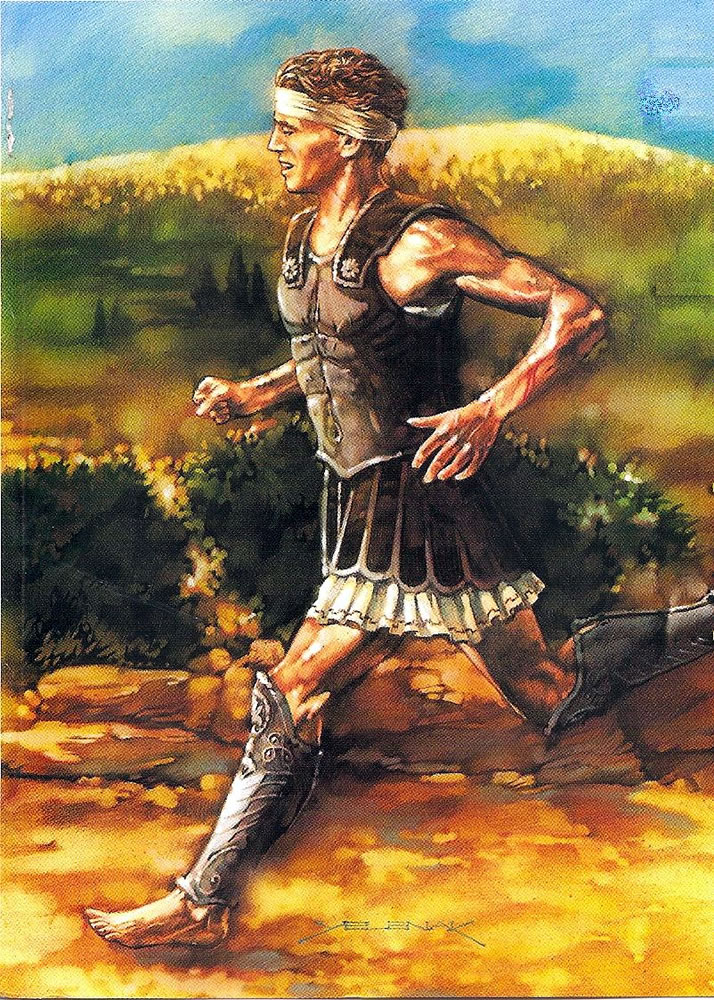In 490 B.C. there was a big war between the Persians and the Greeks.
Persia was a huge empire, much bigger than Greece. It wanted to capture Athens.
The Greek soldiers waited on top of the hill while the Persian army waited on the plain of Marathon below. There were 48,000 Persian soldiers and only 10,000 Greek soldiers.
The Greeks sent a messenger, Pheidippides, to Sparta to get help. He ran for two days over the mountains to ask the Spartans.
But the Spartans would not fight until there was a full moon. Pheidippides returned to Marathon alone.
The Greeks could not wait and attacked the Persian army. The Greeks ran towards the enemy. Persian arrows flew through the air.
The Greeks won. 6,400 Persians were killed but only 192 Greeks died.
The Persians ran to their ships and tried to escape. They tried to go to Athens to capture the Greek women, children and old people waiting there.
Pheidippides now had another job. He ran 40 kilometres to Athens to tell the Greeks that they had won and to tell them that the Persians were coming.
He arrived at the city gates very tired. “Rejoice, we conquer!” he shouted. Then he died.
From this great event the first marathon race of the modern Olympics Games was run in 1896. It was won by a Greek runner, Spiridon Louis.
And, like Pheidippides a long time before, he also carried messages. He was a postman.
Persia was a huge empire, much bigger than Greece. It wanted to capture Athens.
The Greek soldiers waited on top of the hill while the Persian army waited on the plain of Marathon below. There were 48,000 Persian soldiers and only 10,000 Greek soldiers.
The Greeks sent a messenger, Pheidippides, to Sparta to get help. He ran for two days over the mountains to ask the Spartans.
But the Spartans would not fight until there was a full moon. Pheidippides returned to Marathon alone.
The Greeks could not wait and attacked the Persian army. The Greeks ran towards the enemy. Persian arrows flew through the air.
The Greeks won. 6,400 Persians were killed but only 192 Greeks died.
The Persians ran to their ships and tried to escape. They tried to go to Athens to capture the Greek women, children and old people waiting there.
Pheidippides now had another job. He ran 40 kilometres to Athens to tell the Greeks that they had won and to tell them that the Persians were coming.
He arrived at the city gates very tired. “Rejoice, we conquer!” he shouted. Then he died.
From this great event the first marathon race of the modern Olympics Games was run in 1896. It was won by a Greek runner, Spiridon Louis.
And, like Pheidippides a long time before, he also carried messages. He was a postman.
Listen to this story http://learnenglishkids.britishcouncil.org/en/short-stories/the-first-marathon
Fuente: British Council
https://learnenglishkids.britishcouncil.org/sites/kids/files/attachment/stories-the-first-marathon-transcript-final-2012-09-24.pdf
Ejercicios:
READING COMPREHENSION
1. Answer these questions
a. When was the war between the Persians and the Greeks?
b. Who wanted to capture Athens?
c. Where did the Persian army wait?
d. Who did the Greeks send to get help?
e. How many Persians died?
f. How many kilometers did Pheidippides run?
g. Who won the marathon race in 1896?
h. What was his job?
2. Are these sentences true or false?
a. there was a small war.
b. Persia was a small empire.
c. Athens wanted to capture Persia.
d. The Greek soldiers waited on top of the hill.
e. The Persians sent a message.
f. Pheidippides ran for two days.
GRAMMAR
PAST SIMPLE: IRREGULAR VERBS
1. Complete the chart
Base form - past simple - past participle - Spanish
Sent
Ran
Flew
Won
Had
PAST SIMPLE: REGULAR VERBS
1. Complete the chart
Base form - past simple - past participle - Spanish
Wanted
Waited
Returned
Attacked
Died
Tried
Arrived
Shouted
Carried
PAST SIMPLE NEGATIVE
1. Write these sentences in the negative form
a. There was a big war
b. Persia wanted to capture Athens.
c. The Greek soldiers waited on top of the hill.
d. The Greeks sent a message.
e. He ran for two days.
PAST SIMPLE INTERROGATIVE
1. Write these sentences in the interrogative form
a. Pheidippides returned to Marathon alone.
b. The Greeks ran towards the enemy.
c. Persian arrows flew through the air.
d. The Greeks won.
e. He arrived at the city gates vary tired.
GRAMMAR: COMPARATIVE FORM
1. Write the comparative form of these adjectives
a. Big
b. Old
c. Modern
d. tired
VOCABULARY: IRREGULAR PLURALS
1. Write the plural form of these nouns
a. Child
b. Woman
c. Person


No hay comentarios:
Publicar un comentario
Nota: solo los miembros de este blog pueden publicar comentarios.